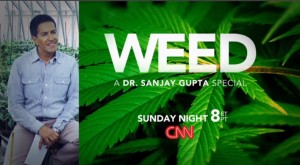
Dr. Sanjay Gupta, CNN’s chief medical correspondent, created a documentary, simply titled WEED, based on a year’s research. The show focused on medical cannabis and aired last night.
Overall, I was very pleased to see this topic being looked at with a decidedly more open-mind than most networks have ever been willing to exhibit. Dr. Gupta did his best (in 43 minutes) to give a broad take on medical marijuana and then gave a few case studies as examples. It was non-political (much less so than Dr. Gupta’s debate on Piers Morgan) and approached with curiosity.
The highlights:
- Illustrated that, when properly administered, medical cannabis is safe enough for children and marvelously effective (often times in cases where absolutely nothing else was working.)
- Showed people at all stages of life benefiting from cannabis use.
- Stated what we all already know: marijuana has never killed anyone, ever. (This point was especially poignant because Dr. Gupta mentioned it right on the heels of saying that someone OD’s on prescription drugs every 19 minutes)
- Offered some very anti-stereotypical faces in support of weed. In fact, other than a small segment on a cannabis festival in Colorado, there was hardly an unwashed Bob Marley T-shirt or hacky-sack to be found! We saw doctors, patients, growers, and even a soldier touting the benefits of cannabis.
- Israeli weed! Apparently, Israel has been on the forefront of marijuana research for decades, gets support from the government, and is even used in hospitals to treat a myriad of illness.
- Briefly talked about why cannabis has such limited exposure in U.S. medical arenas, mentioned that the U.S. government gets itself hung up with bureaucracy and conflicting agencies claiming conflicting information. The headache of getting permission to study cannabis academically often is prohibitive to a scientist who wants to do so.
- Dr. Gupta saying aloud, “Scientists in Israel are learning that cannabis might actually protect the brain, not damage it.”
The lowlights:
- One “expert,” claimed that, due to the increase of cannabis potency, marijuana is much more dangerous than it used to be. This guy, Dr. Mahmoud Elsohly, runs the Ole Miss marijuana research center and I have written about him before. His claim: “someone inexperienced who smokes [newer, stronger strains] will go into the negative effects of the high.” Here we are informed that, in 1972, the THC % was about 1%. Today, it hovers around 13%. Empirically, yes, the amount has gone up. My beef with this is that no one spoke about titration. A novice smoking a full gram in one bowl, yeah that’s a bad idea. The fact weed is more potent actually means you need to smoke less of it to get the effects. If you ask me, I would rather smoke one bowl at the average 13% THC and get what I need than have to smoke 13 bowls of 1% THC to get the same effect. As much as I love the act of smoking, I can’t in good conscience say that breathing in burning plants is a great thing for your lungs (cannabis is not linked to lasting or long-term lung damage, but, still, less smoke in my lungs to deliver the same medication seems like a good thing).
- Yes, we all know THC and CBD are major, if not the major, compounds in cannabis. However we also know there are countless compounds, from other cannabinoids to terpenes, and it’s how all these compounds interplay with each other that helps drive the unique effect of each strain.
- Adolescent cannabis use. I am glad this topic was covered, but I do feel like it was given an incomplete representation. I’m not advocating teen substance abuse at all, I don’t want my sons touching cannabis or alcohol or anything until they are high school graduates. But I feel like they are painting the situation as more dire than it is. One claim made by the documentary is that adolescent cannabis use may lead to future problems and a decline in brain function (this is being questioned and contested, no solid evidence as yet to support this claim). Numerous studies show the enactment of statewide medical cannabis laws is not associated with increased rates of adolescent marijuana consumption.
- Another claim stated roughly 9% or 1 out of 11 cannabis users would develop an addiction. Whenever I think about pot and addiction, I can’t help but think of Bob Saget’s Narc-anon monologue from Half Baked. I’ll let you look it up, but the gist of it is Bob screaming at the pot-head, “Weed? Have you ever sucked d#@k for weed?” Remove cannabis from the picture and I would argue there is a good chance that, out of 11 random teens/people, at least one was going to be a fuck-up anyway. I know a lot of people that I went to high school with that never touched cannabis and, somehow, still ended up being useless asswipes. It would be like arguing that the teen suicide and murder rates would be nearly non-existent if guns were never invented. Guns, like pot, might make it easier for someone already set on a shitty path to reach their shitty end. I would argue that some people falling off society’s approved path is a facet of humanity. Marijuana is simply the vehicle they chose to drive when crashing their lives. Take it away and they will just replace it with alcohol or something worse that will transform a suspected correlation between cannabis and brain function into a concrete correlation between substance abuse and another person dead from an OD. In fact, when asked about cannabis and addiction, one of the pro-weed doctors said, “It’s about learning new behaviors more than it is about dealing with physiological effects.”
All in all, it’s a hell of a good start and I want to thank CNN and Dr. Sanjay Gupta for having the curiosity and courage to take this debate mainstream.









